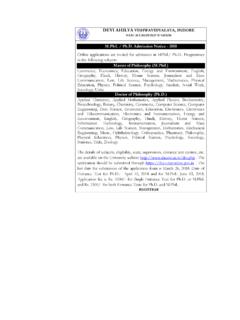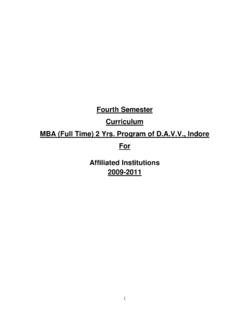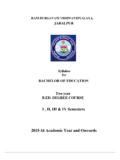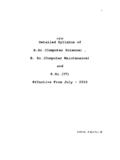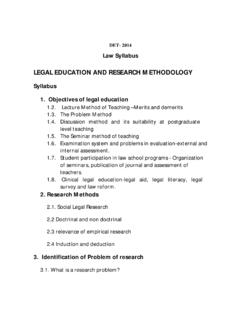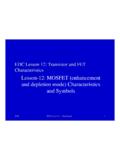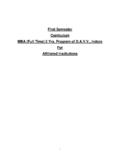Transcription of Function Overloading - Devi Ahilya Vishwavidyalaya …
1 School of Computer Science Overloading In C++, two or more functions can share the same name as long as their parameter declarations are different. In this situation, the functions that share the same name are said to be overloaded, and the process is referred to as Function overloadingSchool of Computer Science To see why Function Overloading is important, first consider three functions defined by the C subset: abs(), labs(), and fabs(). The abs() Function returns the absolute value of an integer, labs() returns the absolute value of a long, and fabs() returns the absolute value of a double. Although these functions perform almost identical actions, in C three slightly different names must be used to represent these essentially similartasks.
2 Example: Function OverloadingSchool of Computer Science Overloading Function Overloading is the process of using the same name for two or more functions . The secret to Overloading is that each redefinition of the Function must use either- different types of parameters different number of of Computer Science Overloading and Ambiguity Ambiguous statements are errors, and programs containing ambiguity will not compile. By far the main cause of ambiguity involves C++'s automatic type of Computer Science Overloading and Ambiguity void f(int x); void f(int // error two functions cannot be overloaded whenthe only difference is that one takes a reference parameter and the other takes a normal, call-by-value of Computer Science // This program contains an error.)
3 #include <iostream> using namespace std; void f(int x); void f(int // error int main() { int a=10; f(a); // error, which f()? return 0; } void f(int x) { cout << "In f(int)\n"; } void f(int &x) { cout << "In f(int }School of Computer Science char myfunc(unsigned char ch); char myfunc(char ch); In C++, unsigned char and char are not inherently of Computer Science #include <iostream> using namespace std; char myfunc(unsigned char ch); char myfunc(char ch); int main() { cout << myfunc('c'); // this calls myfunc(char) cout << myfunc(88) << " "; // ambiguous return 0; } char myfunc(unsigned char ch) { return ch-1; } char myfunc(char ch) { return ch+1.))}
4 }School of Computer Science #include <iostream> using namespace std; float myfunc(float i); double myfunc(double i); int main() { cout << myfunc( ) << " "; // unambiguous, calls myfunc(double) cout << myfunc(10); // ambiguous return 0; } float myfunc(float i) { return i; } double myfunc(double i) { return -i; }School of Computer Science Typedef int integer; Enum days{mon,tue,wed} Void f(int); Void f(mon);School of Computer Science Constructor functions Many times you will create a class for which there are two or more possible ways to construct an object. In these cases, you will want to provide an overloaded constructor Function for each way.
5 The user is free to choose the best way to construct an object given the specific of Computer Science Constructors By default, when one object is used to initialize another. C++ performs a bitwise copy. For Example: MyClass B= A; If a bitwise copy is performed, then B will be an exact copy of A. This means that B will be using the same piece of allocated memory that A is using, instead of allocating its own. If MyClassincludes a destructor that frees the memory, then the same piece of memory will be freed twice when A and B are destroyed!School of Computer Science The same type of problem can occur in two additional ways: first, when a copy of an object is made when it is passed as an argument to a Function ; second, when a temporary object is created as a return value from a Function .
6 To solve the type of problem just described, C++ allows you to create a copy constructor, which the compiler uses when one object initializes of Computer Science The most common general form of a copy constructor is classname (const classname&o) { // body of constructor } Here, o is a reference to the object on the right side of the initialization. It is permissible for a copy constructor to have additional parameters as long as they have defaultarguments defined for them. However, in all cases the first parameter must be areference to the object doing the of Computer Science It is important to understand that C++ defines two distinct types of situations in which the value of one object is given to another.
7 The first is assignment. The second is initialization, which can occur any of three ways: myclass x = y; // y explicitly initializing x func(y); // y passed as a parameter y = func(); // y receiving a temporary, return objectSchool of Computer Science copy_cons1 The copy constructor is called, memory for the new array is allocated and stored in , and the contents of num are copied to x's array. In this way, x and num have arrays that contain the same values, but each array is separate and distinct. If the copy constructor had not been created, the default bitwise initialization would have resulted in x and num sharing the same memory for their arrays. array a(10); // .. array b(10); b = a; // does not call copy constructorSchool of Computer Science the Address of an Overloaded Function You can obtain the address of a Function .
8 Assign the address of the Function to a pointer and then call that Function through that pointer When you assign the address of an overloaded Function to a Function pointer, it is the declaration of the pointer that determines which Function 's address is obtained. Further, the declaration of the Function pointer must exactly match one and only one of the overloaded Function 's declarations. Example:School of Computer Science Function Arguments C++ allows a Function to assign a parameter a default value when no argument corresponding to that parameter is specified in a call to that Function . The default value is specified in a manner syntactically similar to a variable initializationSchool of Computer Science myfunc(double d = ){//.}
9 } Now, myfunc() can be called one of two ways, as the following examples show: myfunc( ); // pass an explicit value myfunc(); // let Function use default The first call passes the value to d. The second call automatically gives d thedefault value of Computer Science There are two advantages to including default arguments, when appropriate, in a constructor Function . First, they prevent you from having to provide an overloaded constructor that takes no parameters. Second, defaulting common initial values is more convenient than specifying them each time an object is declared. In some situations, default arguments can be used as a shorthand form of Function of Computer Science Overloading .
10 In C++, you can overload most operators so that they perform special operations relative to classes that you create. For example, a class that maintains a stack might overload + to perform a push operation and to perform a of Computer Science operators.,()[]||&&>=<=> <!===>>=<<=^=|=&=%=/=-=+==>> <<^|&%/*-+Binary:deletenew->*->()--++&~!*-+Unary:School of Computer Science You overload operators by creating operator functions . An operator Function defines the operations that the overloaded operator will perform relative to the class upon which it will work. An operator Function is created using the keyword operator. Operator functions can be either members or nonmembers of a class.

